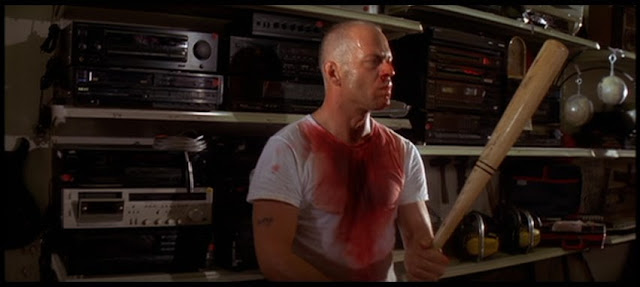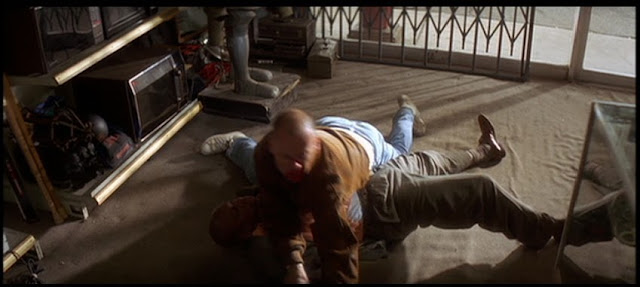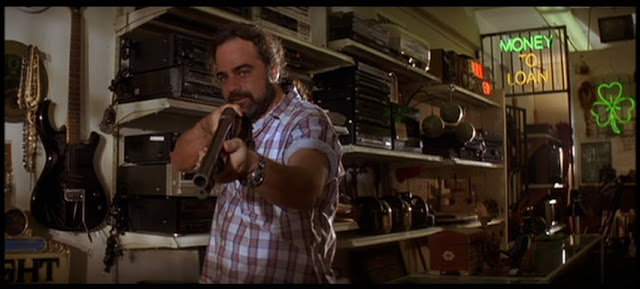In making Pulp Fiction, director and screenwriter Quentin Tarantino uses certain concepts from Zen,[a] which as a distinct school of Buddhism was first documented in China in the 7th century CE. Zen is thought to have developed as an amalgam of various currents in Mahayana Buddhist thought.[b] Mahayana Buddhism regards the bodhisattva as a person who already has a considerable degree of enlightenment and seeks to use their wisdom to help other human beings to become liberated themselves. In this understanding of the word, the bodhisattva is an already wise person.[c]
Butch Coolidge represents a bodhisattva, or more properly, a bodhisattva warrior. In the scene in Marsellus's bar, when Butch accepts money from Marsellus to (supposedly) throw his upcoming boxing match (see screencap at left), he gives the appearance of descending to a lesser sort of warrior. Later, his refusal to go down in the fight (which he actually wins) indicates that he has not really lost honor. Still later, he saves Marsellus, thus appearing to 'recover' his honor as a bodhisattva, which, in fact, he never really lost.
-------------------------------------------------------------------------------------------------------------------------
As discussed in part 1 of the analysis, Jules knows that the briefcase contains what each person who looks into it wants it to contain. In fact, he knows exactly what it contains for each of the three other men mentioned in part 1 (Marsellus, Ringo, and Vincent). The point is that we know Jules has a 'feel' for other people. Thus, Jules has wisdom.
Let us review the timeline of events that we are here interested in, in more detail.

Above left: In the bar scene, Jules looks over in the direction of the table at which Butch and Marsellus are sitting, and judging by Jules' facial expression, his curiosity is piqued. Jules senses that he will need enlightenment to help clarify for himself exactly what Butch is. Above right: A few moments later, Jules heads for the men's restroom with the briefcase in his possession, almost as if he is going to hide with it. We do not see him handing it over to Marsellus at any point; as stated earlier in the analysis, as far as we know, he never does so.


Later in the movie, Butch wins his boxing match, killing his opponent in the process. Marsellus sends Vincent after him. Not long after shooting and killing Vincent (top left and right), Butch happens to encounter Marsellus (above left and right) while driving back to his and Fabienne's motel room.


Almost immediately upon seeing Marsellus, Butch intentionally runs his car into him, sending him over the top of the car (top left). Just after this, Butch's car is hit by another car (top right). Subsequent to this, an injured Marsellus (above left), wielding a pistol in his right hand, chases an injured Butch (above right) on foot.


The foot chase winds up in Maynard's shop, with Butch on top of Marsellus and reaching for Marsellus's gun (top left). Butch takes control of Marsellus, by putting one foot on Marsellus and pointing the gun at him (top right), but a few moments later, Maynard (above left) takes control of both men, ordering Butch to put the gun down and take his foot off of Marsellus. Subsequent to this, Butch and Marsellus end up held captive in Maynard's basement, with both of them tied to chairs, and gagged (above right).

After Butch unties himself and escapes from being watched over by The Gimp (above left), and is about to leave Maynard's shop (above right), he thinks things over, and decides to go back to the basement and rescue Marsellus.


In choosing a weapon to use in order to rescue Marsellus, Butch first considers a hammer (top left), then a bat (top right), and then a chainsaw (above left), finding each of these to be unsuitable. He then finds a samurai sword to be a suitable weapon (above right).


With samurai sword in hand, Butch descends into the shop's basement (top left) to save Marsellus. His doing so is in keeping with his having maintained his honor as a bodhisattva warrior. Using the sword, Butch kills Maynard (top right). Next, a freed Marsellus (above left) uses a shotgun to shoot Maynard's cohort, Zed (above right).
If Butch had left Marsellus to die in Maynard's basement, then there would have been no one around to send any more assassins after Butch. Nevertheless, Butch behaves honorably by saving Marsellus. What Butch actually ends up doing, is saving mankind. To see why this is the case, we need to go back and look at the ransom view of the atonement. Recall from part 9 of the analysis that this theory claimed that Adam and Eve sold humanity over to the Devil at the time of the Fall, and that justice required that God pay the Devil a ransom to free us from the Devil's clutches. The rest of the theory, which was not stated in part 9, is that God tricked the Devil into accepting Christ's death as a ransom, for the Devil did not realize that Christ could not be held in the bonds of death. Once the Devil accepted Christ's death as a ransom, this theory concluded, justice was satisfied and God was able to free us from Satan's grip. That the Devil accepts Christ's death as a ransom is what is indicated when Marsellus (representing the Devil) accepts Butch's word that he will go down in the fight (with Butch representing Christ). And, that Christ cannot be held in the bonds of death is what is indicated by the fact that Butch ends up not only alive, but free.
a. One concept from Zen that Tarantino uses, is the idea that spiritual awakening and wisdom realized by practitioners can be transmitted down through generations. The writings of the Korean monk Chinul centered on Zen, and recall from part 8 of the analysis that Chinul said, that the cultivation of those individuals who achieve sudden awakening/sudden cultivation has, ultimately, been based for many lives on the insights gained in a previous awakening. This applies to Butch, in that two of his patriarchal ancestors, his father and his grandfather, achieved their own respective awakenings, each man's awakening being connected with his being handed the gold watch by his respective father. Butch experienced a kind of awakening upon being handed the watch by Captain Koons as a young boy; but since, as previously observed, Koons is not in Butch's patriarchal lineage, a problem arises regarding the actual handing of the watch to Butch when he was a boy. This will be addressed later in the analysis.
a. Wikipedia, 'Zen'. Web, n.d. URL = https://en.wikipedia.org/wiki/Zen.
b. Wikipedia, 'Bodhisattva'. Web, n.d. URL = https://en.wikipedia.org/wiki/Bodhisattva.












